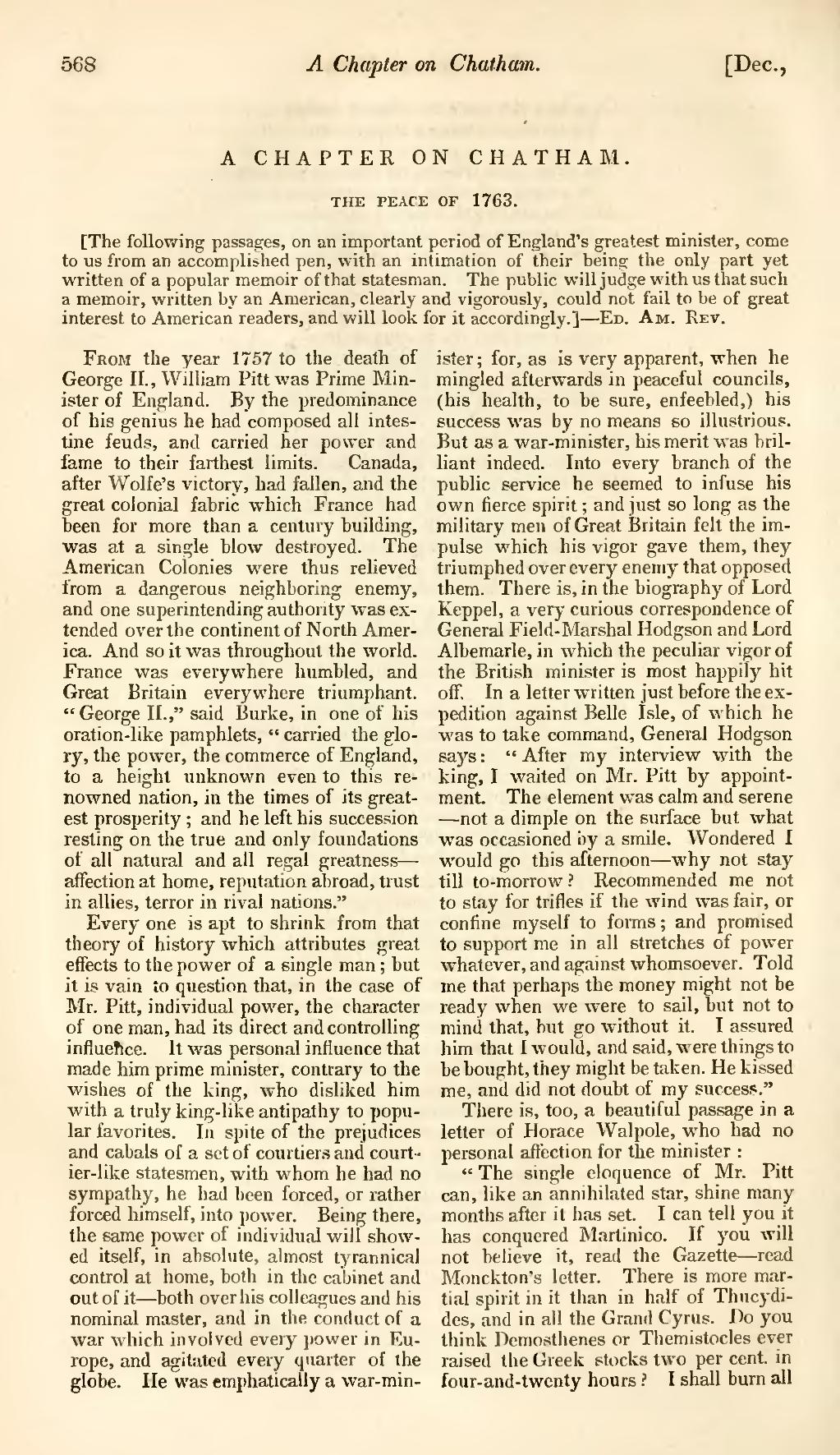A CHAPTER ON CHATHAM.
THE PEACE OF 1763.
[The following passages, on an important period of England's greatest minister, come to us from an accomplished pen, with an intimation of their being the only part yet written of a popular memoir of that statesman. The public will judge with us that such a memoir, written by an American, clearly and vigorously, could not fail to be of great interest to American readers, and will look for it accordingly.]—Ed. Am. Rev.
From the year 1757 to the death of George II., William Pitt was Prime Minister of England. By the predominance of his genius he had composed all intestine feuds, and carried her power and fame to their farthest limits. Canada, after Wolfe's victory, had fallen, and the great colonial fabric which France had been for more than a century building, was at a single blow destroyed. The American Colonies were thus relieved from a dangerous neighboring enemy, and one superintending authority was extended over the continent of North America. And so it was throughout the world. France was everywhere humbled, and Great Britain everywhere triumphant. "George II.," said Burke, in one of his oration-like pamphlets, "carried the glory, the power, the commerce of England, to a height unknown even to this renowned nation, in the times of its greatest prosperity; and he left his succession resting on the true and only foundations of all natural and all regal greatness—affection at home, reputation abroad, trust in allies, terror in rival nations."
Every one is apt to shrink from that theory of history which attributes great effects to the power of a single man; but it is vain to question that, in the case of Mr. Pitt, individual power, the character of one man, had its direct and controlling influence. It was personal influence that made him prime minister, contrary to the wishes of the king, who disliked him with a truly king-like antipathy to popular favorites. In spite of the prejudices and cabals of a set of courtiers and courtier-like statesmen, with whom he had no sympathy, he had been forced, or rather forced himself, into power. Being there, the same power of individual will showed itself, in absolute, almost tyrannical control at home, both in the cabinet and out of it—both over his colleagues and his nominal master, and in the conduct of a war which involved every power in Europe, and agitated every quarter of the globe. He was emphatically a war-minister; for, as is very apparent, when he mingled afterwards in peaceful councils, (his health, to be sure, enfeebled,) his success was by no means so illustrious. But as a war-minister, his merit was brilliant indeed. Into every branch of the public service he seemed to infuse his own fierce spirit; and just so long as the military men of Great Britain felt the impulse which his vigor gave them, they triumphed over every enemy that opposed them. There is, in the biography of Lord Keppel, a very curious correspondence of General Field-Marshal Hodgson and Lord Albemarle, in which the peculiar vigor of the British minister is most happily hit off. In a letter written just before the expedition against Belle Isle, of which he was to take command. General Hodgson says: "After my interview with the king, I waited on Mr. Pitt by appointment. The element was calm and serene—not a dimple on the surface but what was occasioned by a smile. Wondered I would go this afternoon—why not stay till to-morrow? Recommended me not to stay for trifles if the wind was fair, or confine myself to forms; and promised to support me in all stretches of power whatever, and against whomsoever. Told me that perhaps the money might not be ready when we were to sail, but not to mind that, but go without it. I assured him that I would, and said, were things to be bought, they might be taken. He kissed me, and did not doubt of my success."
There is, too, a beautiful passage in a letter of Horace Walpole, who had no personal affection for the minister:
"The single eloquence of Mr. Pitt can, like an annihilated star, shine many months after it has set. I can tell you it has conquered Martinico. If you will not believe it, read the Gazette—read Monckton's letter. There is more martial spirit in it than in half of Thucydides, and in all the Grand Cyrus. Do you think Demosthenes or Themistocles ever raised the Greek stocks two per cent, in four-and-twenty hours? I shall burn all
